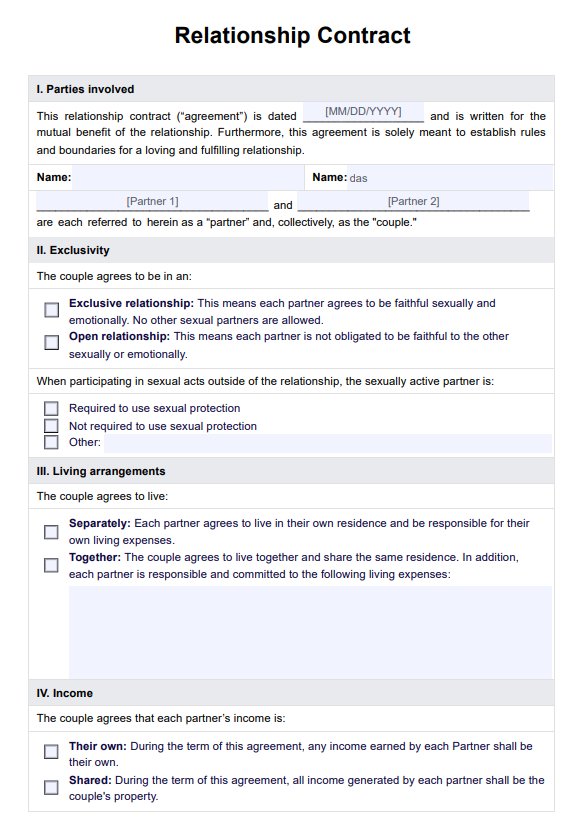
Learn how to create an effective Relationship Contract that can benefit the expectations and goals within your partnerships today through this handy guide and template!

By Harriet Murray on Jul 17, 2024.


A Relationship Contract Template is a written document outlining the agreements, expectations, boundaries, and responsibilities typically shared between individuals in a romantic relationship, but can also be utilized in platonic, familial, or work relationships. It's a way for individuals to openly communicate and define various aspects of their relationships; rather than hold legal obligations, a Relationship Contract offers clarity for people to develop a shared vision.
Creating a Relationship Contract fosters and encourages openness, honesty, and courage. Its creation provides an opportunity for individuals to express what matters most to them within a relationship, and although difficult to do, it can have long-lasting benefits on the expectations and communication within the relationship. Put wisely by American writer Mandy Len Catron on relational contracting, “Every relationship is contractual. We’re just making the terms explicit” (Tagle & Schneider, 2022).
This tool or exercise gives power to the individuals to shy away from problematic and passive ideas tied to romance and instead focus on agency and thoughtfulness in intimate relationships. This is not a legally binding document but rather a clear expression of the parameters unique to that particular relationship. A Relationship Contract is a mutual agreement between partners that outlines the expectations, boundaries, and responsibilities within the relationship.
It's a proactive approach to fostering healthy communication, establishing guidelines, and maintaining transparency. These contracts usually cover various aspects of the relationship, such as financial matters, division of household chores, communication preferences, personal space, fidelity, and future goals. Each partner openly discusses their needs, desires, and non-negotiables, allowing both parties to understand each other's perspectives and create a framework for a fulfilling partnership.
These contracts are not about depriving spontaneity or romance; instead, they serve as a tool to build trust and respect by acknowledging and honoring each other's needs. They provide a clear roadmap for navigating potential conflicts or misunderstandings by referring back to agreed-upon terms.
It is important to note that the contract's success lies in its flexibility and adaptability to changing circumstances. Regular check-ins and revisions are crucial to accommodate personal growth or shifts in the relationship dynamics.